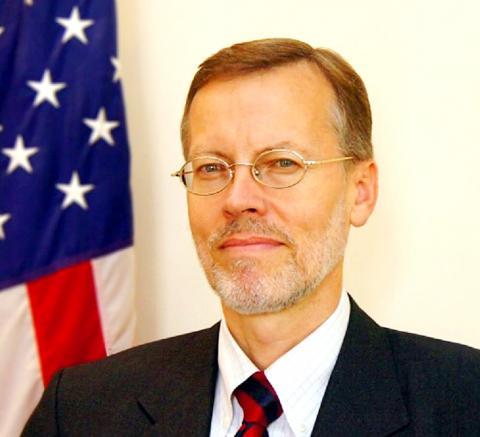The government yesterday welcomed Washington’s appointment of former American Institute in Taiwan (AIT) deputy director Brent Christensen as the new AIT director, praising him as being instrumental in the US’ implementation of several Taiwan-friendly initiatives.
The AIT announced in a press release yesterday morning that Christensen, a veteran US diplomat with nearly 30 years of service, is to succeed outgoing AIT Director Kin Moy.
Moy, the first US diplomat of Chinese descent to head the AIT’s Taipei office, is expected to leave next month the post he has occupied since June 2015, but the AIT has yet to release a specific date for his departure.

Photo: screen grab from the US Department of State Web site
Presidential Office spokesman Sidney Lin (林鶴明) said Christensen is a senior diplomat with a solid resume and is well-versed in US-Taiwan relations.
“During his tenure as director of the US Department of State’s Office of Taiwan Coordination from 2010 to 2012 and deputy director of the AIT from 2012 to 2015, Christensen had made every possible effort to further Taiwan-US ties. He was also involved in several initiatives vital to bilateral relations,” Lin said.
Following the completion of the AIT’s new compound in Taipei’s Neihu District (內湖), which cost the US government US$255.6 million and serves as a significant milestone in Taiwan-US relations, Lin said he hoped to see bilateral ties and cooperation between Taiwan and US reach new heights under Christensen’s leadership.
Lin also expressed the government’s gratitude to Moy for his dedication to the development of Taiwan-US ties over the past three years.
Moy was earlier this month given the Grand Medal of Diplomacy, the highest honor Taiwan gives to an individual for diplomatic contributions.
“Recent progress in Taiwan-US relations serves as a testament to the concrete foundations that have been laid down by all of the AIT’s previous directors. We will continue to further bilateral partnership based on these foundations,” Lin said.
Meanwhile, the Ministry of Foreign Affairs also welcomed the appointment of Christensen, who it said has an in-depth understanding of major issues concerning Taiwan and the US, as well as the government’s policy stance.
Christensen has played a role in Washington’s implementation of several Taiwan-friendly initiatives, the ministry said, citing as examples Taiwan’s inclusion in the US’ Visa Waiver Program in 2012, the signing of a new version of the Agreement on Privileges, Exemptions and Immunities between the AIT and the Taipei Economic and Cultural Representative Office in the US in 2013, and the establishment of the US-Taiwan Global Cooperation and Training Framework in 2015.
He has also facilitated visits by high-level US officials to Taiwan, including then-US environmental protection agency administrator Gina McCarthy in 2014 and then-US assistant secretary of state for economic and business affairs Charles Rivkin in 2015, the ministry said.
“The ministry looks forward to Christensen’s inauguration and to working closely with him to further the Taiwan-US partnership based on the foundations laid down by Moy and his predecessors,” it said.
Asked when Christensen would take office, the AIT said the date would be announced in the near future.

SECURITY: As China is ‘reshaping’ Hong Kong’s population, Taiwan must raise the eligibility threshold for applications from Hong Kongers, Chiu Chui-cheng said When Hong Kong and Macau citizens apply for residency in Taiwan, it would be under a new category that includes a “national security observation period,” Mainland Affairs Council (MAC) Minister Chiu Chui-cheng (邱垂正) said yesterday. President William Lai (賴清德) on March 13 announced 17 strategies to counter China’s aggression toward Taiwan, including incorporating national security considerations into the review process for residency applications from Hong Kong and Macau citizens. The situation in Hong Kong is constantly changing, Chiu said to media yesterday on the sidelines of the Taipei Technology Run hosted by the Taipei Neihu Technology Park Development Association. With

CARROT AND STICK: While unrelenting in its military threats, China attracted nearly 40,000 Taiwanese to over 400 business events last year Nearly 40,000 Taiwanese last year joined industry events in China, such as conferences and trade fairs, supported by the Chinese government, a study showed yesterday, as Beijing ramps up a charm offensive toward Taipei alongside military pressure. China has long taken a carrot-and-stick approach to Taiwan, threatening it with the prospect of military action while reaching out to those it believes are amenable to Beijing’s point of view. Taiwanese security officials are wary of what they see as Beijing’s influence campaigns to sway public opinion after Taipei and Beijing gradually resumed travel links halted by the COVID-19 pandemic, but the scale of

A US Marine Corps regiment equipped with Naval Strike Missiles (NSM) is set to participate in the upcoming Balikatan 25 exercise in the Luzon Strait, marking the system’s first-ever deployment in the Philippines. US and Philippine officials have separately confirmed that the Navy Marine Expeditionary Ship Interdiction System (NMESIS) — the mobile launch platform for the Naval Strike Missile — would take part in the joint exercise. The missiles are being deployed to “a strategic first island chain chokepoint” in the waters between Taiwan proper and the Philippines, US-based Naval News reported. “The Luzon Strait and Bashi Channel represent a critical access

Pope Francis is be laid to rest on Saturday after lying in state for three days in St Peter’s Basilica, where the faithful are expected to flock to pay their respects to history’s first Latin American pontiff. The cardinals met yesterday in the Vatican’s synod hall to chart the next steps before a conclave begins to choose Francis’ successor, as condolences poured in from around the world. According to current norms, the conclave must begin between May 5 and 10. The cardinals set the funeral for Saturday at 10am in St Peter’s Square, to be celebrated by the dean of the College